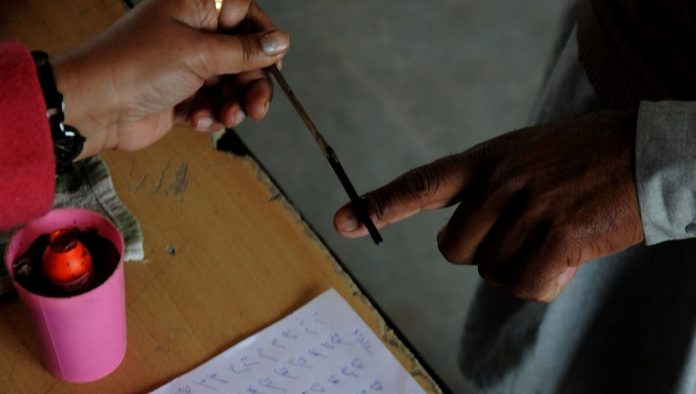By Prachi Salve
There has been a decrease in the number of members of legislative assembly (MLAs) with criminal records in Uttar Pradesh, Punjab and Goa of the five states that elected new state governments, according to our analysis of data compiled by Association for Democratic Reforms (ADR), an advocacy.
Of 690 MLAs elected in Uttar Pradesh, Uttarakhand, Punjab, Manipur and Goa, 27.8 per cent (192) have a criminal record, while 20 per cent (140) face serious criminal charges, such as murder, kidnapping and extortion, the data show.
While the number of MLAs with criminal records declined in three of five states, the number of MLAs with serious criminal charges increased in all states, except Manipur.
The Bharatiya Janata Party (BJP) swept Uttar Pradesh with a record 312 of 403 seats, and the Congress emerged as the single largest party in three of five states.
As many as 1,000 candidates contesting the elections in the five states had criminal charges against them and 850 candidates had serious criminal charges.
There was a 19.2 per cent rise in the number of MLAs without a criminal record in Uttar Pradesh in 2017 over 2012, the largest increase in crime-free lower-house legislators among the five states.
The new Uttar Pradesh assembly will have 260 MLAs (of 403) without a criminal record. The state saw a decline in the number of MLAs with a criminal record, from 189 in 2012 to 143 in 2017.
However, the number of MLAs with serious criminal records in Uttar Pradesh has gone up from 98 in 2012 to 107 in 2017.
Punjab reported a three per cent increase in the number of MLAs without criminal records in 2017 over 2012, with 19 MLAs with a clean record elected in 2017 compared to 16 in 2012.
Goa saw an increase of 10 per cent in MLAs without criminal records, with 31 MLAs with no criminal record being elected in 2017 compared to 28 in 2012.
Manipur and Uttarakhand saw a decline in the number of MLAs with no criminal records. But Manipur, which had no MLAs with criminal records in 2012, elected two MLAs with serious criminal charges. In Uttarakhand, these numbers more than tripled, from four in 2012 to 14 in 2017.
Of the 690 MLAs whose records were analysed by ADR, 192 had criminal cases registered against them and 140 had serious offences registered: 540 are crorepatis.
Of 140 candidates in five states, 10 faced murder and 37 attempt-to-murder charges. There was a decline in the overall proportion of MLAs facing criminal charges across these states, from 33.6 per cent in 2012 to 27.8 per cent in 2017.
Of 403 MLAs in Uttar Pradesh, 36 per cent have a criminal record and 26 per cent face serious criminal charges; the BJP has 83 (of 312) MLAs with criminal charges — compared with 25 of 47 in 2012 — followed by 11 of the Samajwadi Party.
In Uttar Pradesh, eight MLAs have declared cases related to murder against themselves and 34 MLAs have declared cases related to attempt to murder. These declarations are required by the Election Commission of India. Criminal cases do not debar anyone from contesting elections.
In Punjab, the number of MLAs with serious criminal records went up from five to 11 between 2012 and 2017. Punjab had 11 MLAs with criminal charges, of which seven were from the Congress, including Chief Minister Captain Amarinder Singh (four charges relating to cheating and forgery).
Goan MLAs with serious charges over the same period (2012-17) rose from two to six, according to the ADR data.


